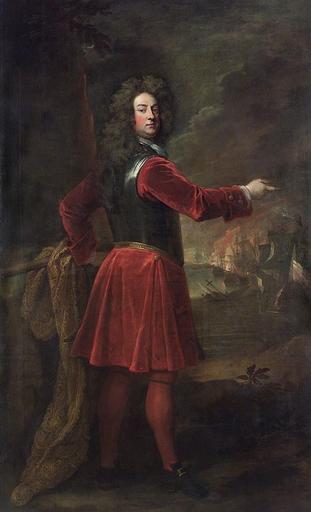MAKE A MEME
View Large Image

| View Original: | Adminral_of_the_Fleet_Edward_Russell.jpg (560x921) | |||
| Download: | Original | Medium | Small | Thumb |
| Courtesy of: | www.flickr.com | More Like This | ||
| Keywords: Admiral of the Fleet Edward Russell, 1st Earl of Orford, PC (1653 – 26 November 1727) was the First Lord of the Admiralty under King William III. He was a son of the Hon. Edward Russell, a younger son of the 4th Earl of Bedford and a younger brother of the 5th Earl (later 1st Duke of Bedford). He married his cousin, Lady Margaret Russell, youngest daughter of the 5th Earl, but they had no children. He was one of the first gentleman officers of the Royal Navy regularly bred to the sea. In 1671, he was named Lieutenant at the age of eighteen and was promoted to Captain in the following year. In the Third Anglo-Dutch War he saw active service in the North Sea in 1672 and 1673. Russell later served in the Mediterranean in the operations against the Barbary Pirates with Sir John Narborough and Arthur Herbert from 1676 to 1682. In 1683 he ceased to be employed, as all of the members of the Russell family had fallen into disfavour with the King after the discovery of Lord Russell's connection with the Rye House Plot. In 1688, Russell was one of the Immortal Seven, a group of English nobleman who issued the Invitation to William, a document asking William of Orange to depose King James II. In the subsequent War of the Grand Alliance, Russell served at sea, commanding a fleet after 1690. In 1692, Russell was Commander-in-Chief of the Anglo-Dutch force that fought the French fleet at Barfleur, and destroyed much of it at La Hougue, his victory there being the decisive naval battle of the war. Russell became First Lord of the Admiralty in 1694, remaining in that post until 1699. He served in the Mediterranean from 1694 to 1695 and was created Baron Shingay, Viscount Barfleur, and Earl of Orford in 1697. These titles all became extinct on the childless Orford's death. On the orders of King William III, he was the first British commander to over-winter at Cadiz (rather than sailing his squadron home in the autumn) and so inaugurated a policy that led to the acquisition of a British Mediterranean base at Gibraltar in 1704. Admiral of the Fleet Edward Russell, 1st Earl of Orford, PC (1653 – 26 November 1727) was the First Lord of the Admiralty under King William III. He was a son of the Hon. Edward Russell, a younger son of the 4th Earl of Bedford and a younger brother of the 5th Earl (later 1st Duke of Bedford). He married his cousin, Lady Margaret Russell, youngest daughter of the 5th Earl, but they had no children. He was one of the first gentleman officers of the Royal Navy regularly bred to the sea. In 1671, he was named Lieutenant at the age of eighteen and was promoted to Captain in the following year. In the Third Anglo-Dutch War he saw active service in the North Sea in 1672 and 1673. Russell later served in the Mediterranean in the operations against the Barbary Pirates with Sir John Narborough and Arthur Herbert from 1676 to 1682. In 1683 he ceased to be employed, as all of the members of the Russell family had fallen into disfavour with the King after the discovery of Lord Russell's connection with the Rye House Plot. In 1688, Russell was one of the Immortal Seven, a group of English nobleman who issued the Invitation to William, a document asking William of Orange to depose King James II. In the subsequent War of the Grand Alliance, Russell served at sea, commanding a fleet after 1690. In 1692, Russell was Commander-in-Chief of the Anglo-Dutch force that fought the French fleet at Barfleur, and destroyed much of it at La Hougue, his victory there being the decisive naval battle of the war. Russell became First Lord of the Admiralty in 1694, remaining in that post until 1699. He served in the Mediterranean from 1694 to 1695 and was created Baron Shingay, Viscount Barfleur, and Earl of Orford in 1697. These titles all became extinct on the childless Orford's death. On the orders of King William III, he was the first British commander to over-winter at Cadiz (rather than sailing his squadron home in the autumn) and so inaugurated a policy that led to the acquisition of a British Mediterranean base at Gibraltar in 1704. | ||||